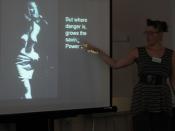Patrick Angelo
Mamigonian, Period 5
October 16, 2012
Angelo
A Complex View of Hester Prynne
Even though one may not see a narrator as having such an important role in a novel, the narrator's thoughts and ideas permeate into a reader's understanding of The Scarlet Letter. Hester's sin of adultery with Arthur Dimmesdale is a major focus point in which the narrator's viewpoints of Hester for this crime change greatly during the course of Hester's life. Originally, the narrator approves of Hester's decision to take her sin head on by directly putting herself though public shame and making it her passion to repent. However, as her passion fades away and she second guesses herself for these actions, the narrator disapproves. Nevertheless, by the end of Hester's journey, the narrator comes to a realization that her adultery "had a consecration of its own" (178) and accepts her choice to commit this sin.
Although Nathaniel Hawthorne's narrator in The Scarlet Letter (1850) initially admires Hester for her passion to become a martyr for her sin and then disapproves of her thoughts to change this passion, he ultimately accepts and understands Hester's choice to commit adultery as the direct result of love.
Due to Hester's full recognition and acceptance of her sin and punishment, the narrator admires her. The narrator's admiration stems out of his respect and approval of Hester's choice to endure the public ignominy as penance for her sin. As a result of high public ignominy, the narrator would assume that Hester should choose to leave Boston: "where the wildness of her nature might assimilate itself with a people whose customs and life were alien from the law that had condemned her,-it may seem marvelous, that this woman should still call that place her home, where, and where only, she...


